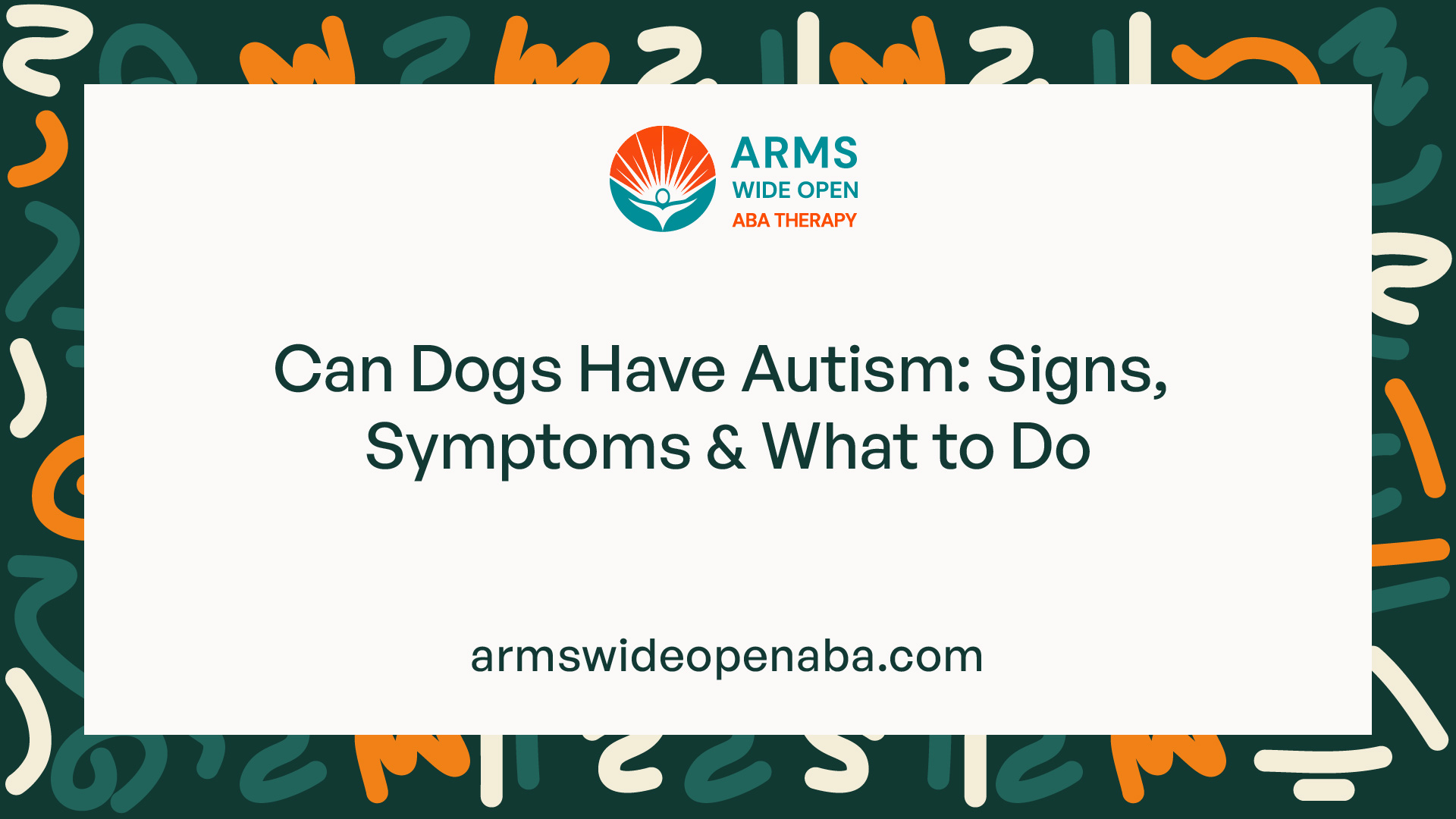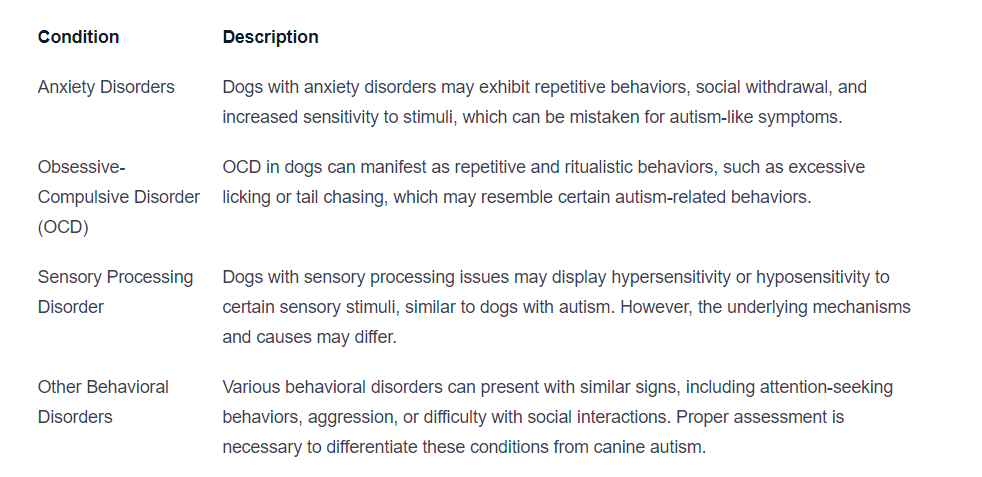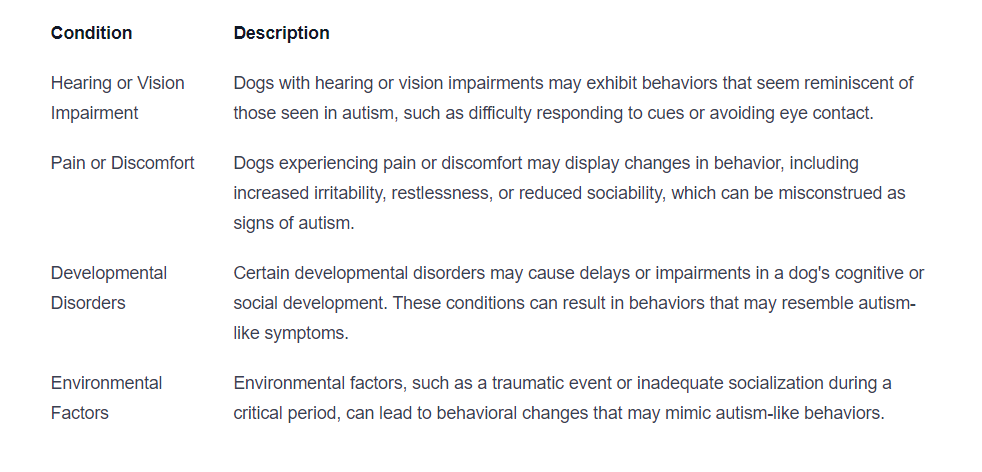Can Dogs Have Autism: Signs, Symptoms & What to Do
Unraveling the canine mind: Can dogs have autism? Discover the signs, symptoms, and how to support them.

Understanding Canine Neurodiversity
To explore the concept of canine neurodiversity, it is essential to understand what neurodiversity means and whether dogs can have autism.

What is Neurodiversity?
Neurodiversity is a concept that recognizes and celebrates the natural variations in neurological development among individuals. It emphasizes that neurological differences, such as autism, ADHD, and other conditions, are simply part of the natural diversity of human and animal brains. Neurodiversity promotes acceptance and understanding of these differences, encouraging society to accommodate and support individuals with diverse neurotypes.
Can Dogs Have Autism?
The question of whether dogs can have autism is a topic of ongoing research and discussion among experts in the field. While autism is primarily diagnosed in humans, some researchers suggest that there may be similar neurodevelopmental conditions in animals, including dogs.
It is important to note that the diagnosis and understanding of autism in dogs is not yet well-established. The behaviors and characteristics associated with autism in humans may not present in the same way in dogs. However, some studies have explored behavior patterns in dogs that may resemble certain aspects of autism in humans.
Researchers are investigating canine behaviors related to social interaction, communication, repetitive behaviors, and sensory sensitivities to gain a better understanding of neurodiversity in dogs. By studying these behaviors, they aim to identify potential similarities or differences between canine and human neurodevelopmental conditions.
Further research is needed to determine whether dogs can have a condition similar to autism and how it manifests in their behavior and neurological makeup. The exploration of canine neurodiversity contributes to our understanding of the complexity of animal cognition and the wide range of neurotypes that exist across different species.
Understanding canine neurodiversity and the possibility of conditions like autism in dogs can lead to enhanced empathy, support, and customized care for our furry friends. By recognizing and respecting their unique neurological profiles, we can provide a more inclusive and understanding environment for all animals.
Signs and Symptoms of Canine Autism
When it comes to understanding canine neurodiversity, it is essential to recognize the signs and symptoms of canine autism. Just like humans, dogs can exhibit behaviors that are indicative of autism spectrum disorder. Here, we will explore the behavioral signs, social interaction challenges, and sensory sensitivities that may be observed in dogs with autism.
Behavioral Signs
Dogs with autism may display various behavioral signs that differ from typical canine behavior. These signs can include repetitive behaviors, such as spinning or tail chasing, which are performed excessively and without an apparent purpose. They may also exhibit self-stimulatory behaviors, like excessive licking or paw chewing. Additionally, dogs with autism may have difficulty adapting to changes in their routine and environment, often showing signs of distress or anxiety.
Social Interaction Challenges
Another aspect of canine autism involves challenges in social interaction. Dogs with autism may struggle to engage in typical social behaviors with humans and other animals. They may exhibit a lack of interest in social interactions, seem aloof or indifferent, or have difficulty understanding and responding to social cues. These dogs may also struggle with forming and maintaining relationships with other dogs or bonding with their human companions.
Sensory Sensitivities
Sensory sensitivities are common in dogs with autism. They may be hypersensitive or hyposensitive to certain stimuli, such as noise, touch, or visual stimuli. For example, a dog with autism may become overwhelmed by loud noises or exhibit fear or anxiety in response to specific sounds. On the other hand, they may also show reduced sensitivity to pain or fail to respond to certain sensory stimuli.
Understanding these signs and symptoms of canine autism is crucial in identifying and providing appropriate care for dogs that may be neurodiverse. It's essential to keep in mind that these behaviors alone may not conclusively indicate autism, as other medical or behavioral conditions can present similar symptoms. Seeking professional guidance from a veterinarian is important to obtain an accurate diagnosis and develop an appropriate management plan for your dog.
By being aware of these signs, pet owners and caretakers can better understand their dogs and create a supportive environment that meets their unique needs. Celebrating the neurodiversity of dogs and promoting understanding and acceptance are essential in ensuring the well-being and happiness of all our furry friends.
Canine Autism or Something Else?
When observing certain behaviors in dogs that resemble those associated with autism, it's important to consider the possibility of other conditions that may present similar symptoms. A thorough differential diagnosis is essential to rule out other potential causes and determine the most appropriate course of action for your furry companion.
Differential Diagnosis
A differential diagnosis involves the process of distinguishing between two or more conditions that share similar signs and symptoms. In the case of canine autism, it is crucial to consider other potential explanations for the observed behaviors. Some conditions that might be mistaken for canine autism include:

Other Conditions That May Present Similar Symptoms
In addition to the conditions mentioned above, there are other medical and behavioral issues that can exhibit symptoms resembling those associated with canine autism. Some of these conditions include:

Differentiating between canine autism and other conditions requires careful evaluation by a qualified veterinarian or animal behaviorist. They will consider the specific signs and symptoms observed in your dog, conduct necessary tests or assessments, and provide an accurate diagnosis.
Remember, each dog is unique, and behaviors that resemble autism may have various underlying causes. Seeking professional guidance is crucial to ensure your dog receives appropriate care and support tailored to their specific needs.
What to Do If You Suspect Canine Autism
If you suspect that your dog may have autism or a neurodiverse condition, it's important to take the necessary steps to understand their behavior and provide appropriate support. Here are some actions you can take if you suspect canine autism:
Consulting with a Veterinarian
The first step is to consult with a veterinarian who specializes in behavioral issues or neurology. They can conduct a thorough examination of your dog, consider their medical history, and assess their behavior. A veterinarian will be able to provide a professional evaluation and determine if the observed behaviors are indicative of autism or if there may be other underlying causes. It's crucial to involve a veterinarian in the process to rule out any potential medical conditions that may be contributing to the observed behaviors.
Behavioral Modification Strategies
Once a diagnosis or suspicion of canine autism is confirmed, working with a professional dog behaviorist or trainer experienced in working with neurodiverse dogs can be beneficial. They can help develop and implement appropriate behavioral modification strategies tailored to your dog's specific needs. These strategies may include positive reinforcement training, structured routines, and environmental enrichment to support your dog's emotional well-being and address any challenging behaviors they may exhibit.
Creating a Supportive Environment
Creating a supportive environment is essential for dogs with autism. This includes establishing a predictable routine, providing a safe and secure space, and minimizing triggers that may cause sensory overload. Paying attention to your dog's individual sensory sensitivities and adapting their environment accordingly can greatly improve their quality of life. For instance, providing quiet spaces, using soft lighting, and using positive reinforcement techniques can help reduce anxiety and promote a sense of security.
It's important to remember that every neurodiverse dog is unique, and what works for one may not work for another. Patience, understanding, and consistency are key when providing support for a dog with autism. Seek guidance from professionals who specialize in working with neurodiverse dogs as they can offer valuable insights and develop a tailored plan to meet your dog's specific needs.
By consulting with a veterinarian, implementing behavioral modification strategies, and creating a supportive environment, you can provide the necessary care and support for your dog with suspected autism. Embracing their neurodiversity and providing them with the tools they need will help them lead a fulfilling and happy life.
Embracing Neurodiverse Dogs
When it comes to understanding canine neurodiversity, it's important to embrace and celebrate the differences that exist among dogs. Just like humans, dogs can have unique personalities and behaviors that may fall outside of what is considered "typical." Embracing neurodiverse dogs involves recognizing their individuality and promoting understanding and acceptance.
Celebrating Differences
One way to embrace neurodiverse dogs is by celebrating their differences. Instead of viewing atypical behaviors as problems, it's important to appreciate the unique qualities that make each dog special. By celebrating their differences, we can create an inclusive and accepting environment that honors their individuality.
Promoting Understanding and Acceptance
Promoting understanding and acceptance is another crucial aspect of embracing neurodiverse dogs. Educating ourselves and others about different neurodivergent conditions, including canine autism, helps to foster empathy and compassion. By understanding the challenges that neurodiverse dogs may face, we can provide them with the support and care they need.
Creating a supportive environment for neurodiverse dogs involves implementing strategies that cater to their specific needs. This may include providing a structured routine, offering sensory enrichment activities, and using positive reinforcement training techniques tailored to their individual requirements. Consulting with a veterinarian or a professional dog behaviorist can provide valuable guidance in creating a supportive environment for neurodiverse dogs.
By embracing neurodiverse dogs, we can create a society that appreciates and respects the unique qualities of each individual. It's important to remember that neurodiversity is a natural part of the canine population, and every dog deserves love, understanding, and acceptance.
Sources
https://petcheckurgentcare.com/signs-of-autism-in-dogs/
https://www.rover.com/blog/can-dogs-have-autism/
https://www.totalcareaba.com/autism/can-dogs-have-autism
Similar articles
We’re here to help you

Our team is here to assist you in this process. Contact us for any assistance.
it’s easy to apply
We Accept Most Insurances
Our in-network insurance partnerships make ABA therapy more accessible to families throughout our service areas.







Our Insurance Process
We'll request your insurance details to help us verify your plan's coverage for ABA therapy. Once we've received this information, we'll walk you through your benefits, including copayments, deductibles and out-of-pocket maximums, so you know what to expect in advance.
Our team will then handle the preauthorization and all the necessary paperwork.
.svg)





















.jpeg)


































.jpeg)




.jpeg)







.jpeg)











.jpeg)
















